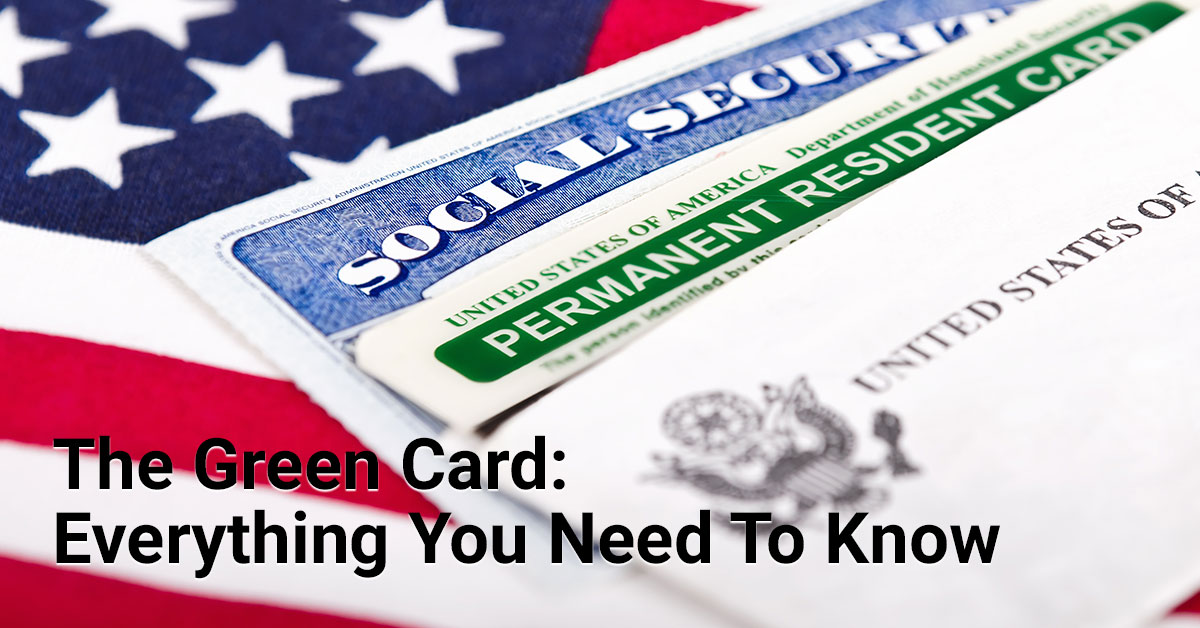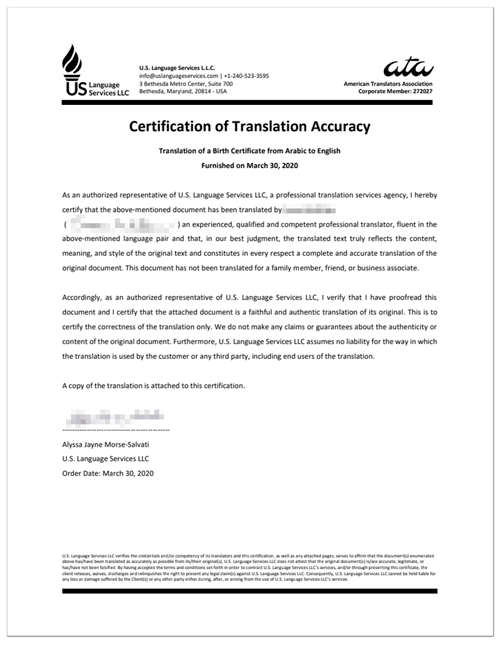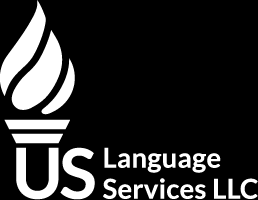The Green Card: Everything You Need To Know In 2021
What is a Green Card?
The green card gives non-US citizens the privilege to work and live in the United States without any restrictions. Although popularly called a “green card,” the government-issued card is recognized officially as a Permanent Resident Card (PRC).
Be careful not to mistake the green card for U.S. citizenship. These two terms are entirely different.
While citizens of the United States can vote during elections, travel outside the country for an extended period, and partake in all federal benefits, green card holders (also called Lawful Permanent Residents or LPRs) may not enjoy these privileges.
Nonetheless, the green card is essential for any alien who wishes to live full-time in the United States, pursue a career, and ultimately, become a U.S. citizen.
What are the Different Types of Green Cards?
Green cards are granted to aliens (i.e., non-US citizens) who meet specific requirements.
Below are the seven common types of green cards:
- Green cards granted to qualified family members
- Green cards granted to US-based employees/investors
- Green cards granted to victims of human trafficking and crime
- Green cards granted to asylees and refugees
- Green cards granted to abuse victims
- Green cards granted to long-time U.S. residents
- Green cards granted to people who fall under specific categories
Familiarize yourself with key U.S. immigration terms:
U.S. Language Services LLC is not a law firm and does not provide legal advice. As a result, it is not a substitute for legal counsel. If you need assistance submitting your paperwork, please seek out the advice of a lawyer.
U.S. Language Services LLC is not affiliated with or endorsed by the United States Citizenship and Immigration Services (USCIS) or any other agency of the United States government.
Green Cards Granted to Qualified Family Members

Immediate relatives of a lawful permanent resident (LPR) or U.S. citizen could qualify for a green card based on their family relationship.
Green cards offered under this category are strictly based on the applicant’s closeness to their U.S. relative. While grandparents, cousins, and nephews/nieces aren’t eligible for family-based green cards, much closer relatives like siblings, adult children, minor children, spouses, and parents of U.S. citizens or LPRs are recognized as eligible applicants.
Widows/widowers also fall under this category and will be granted permanent residency if their deceased spouse was either a U.S. citizen or a green card holder.
Verifications are usually made to ensure that widows/widowers requesting a green card were legally married to their deceased spouse (and aren’t remarried yet).
Since every document for the verification must be in English, we recommend that applicants prepare translated copies of their documents to avoid unnecessary delays.
Other categories of applicants who qualify for a family-based green card are fiancés/fiancées of U.S. citizens or LPRs and individuals abused or maltreated by a green card holder or U.S. citizen.
At U.S. Language Services, we’ve helped hundreds of green card applicants translate their documents—birth certificates, death certificates, medical reports, etc.—into English, following a stress-free approach.
All you need to do is place an order and then allow our professional translators to translate your documents from your native language (Chinese, French, Spanish, etc.) to English.
Green Cards Granted to US-based Employees / Investors

Aliens could become eligible for a green card based on their employment status in the United States. And, in some instances, their immediate family members may also be granted permanent residence.
Employment-based (EB) green cards are given to professionals, unskilled professionals, and other individuals in specific work fields. We’ve highlighted below the subcategories of employment-based green cards and the professions that fall under each category.
1. Priority workers (EB-1)
Green cards under this category are granted to aliens who:
- Are professors or researchers with a track record of excellence
- Are multinational managers and executives
- Possess outstanding abilities in the arts, business, sciences, education, and athletics
2. Professionals with exceptional abilities and advanced educational degrees (EB-2)
Green cards under this category are granted to aliens who:
- Possess outstanding abilities in the arts, business, or sciences
- Have professions that require an advanced degree
- Are physicians, meet specific requirements, and agree to work full-time in the United States in certain designated areas
3. Unskilled, skilled, and professional workers (EB-3)
Green cards under this category are granted to aliens with:
- A profession that requires them to possess at least two years of training or work experience (i.e., they are skilled workers)
- A profession that requires them to possess, at least, a Bachelor’s degree obtained from a U.S. university/college or an equivalent from other international countries (i.e., they are professionals)
- A job that requires unskilled labor and does not require a minimum of two years of experience or training (i.e., they are unskilled workers)
4. Special immigrants (EB-4)
Certain aliens, referred to as Special Immigrants, could become lawful permanent residents of the United States.
Aliens who fall under this category are:
- Some international broadcasters and employees/retirees of specific international organizations
- Religious workers (occupying ministerial and non-ministerial positions)
- Afghans or Iraqis who worked for the U.S. government as translators/interpreters and in other areas
5. Immigrant investors (EB-5)
To qualify for a green card under this category, a foreign investor must have invested—or be in the process of investing—the sum of $1.8 million (or $900,000) in targeted employment areas (TEAs) with high-underemployment. This investment must be in an enterprise that would create job opportunities for at least ten qualified employees in the area.
Green Cards Granted to Victims of Human Trafficking and Crime
Victims of some severe forms of human trafficking may apply for T nonimmigrant status (also called T Visa), which would allow them to reside in the United States for up to four years from when the visa was issued.
With the T nonimmigrant status, victims of human trafficking could become lawful permanent residents if they meet the following requirements:
- Since entering the United States, they must have maintained good moral conduct (i.e., not have committed crimes like prostitution and fraud).
- They must have assisted law enforcement in tracking the traffickers and prosecuting them. (Victims could bypass this requirement if they show signs of mental instability or are under 18.)
- They must have resided continuously in the United States for up to three years (since receiving the T nonimmigrant status) or stayed continually in the United States while law enforcement investigated and prosecuted the perpetrators.
- They must prove that leaving the United States might expose them to harm and extreme hardship.
Victims of several other criminal activities may also qualify for the U nonimmigrant status (U Visa) and a U.S. green card.
Green Cards Granted to Asylees and Refugees
Non-citizens can seek refuge in the United States if they fear returning to their home country due to possible persecution caused by their religious belief, political stand, ethnicity, nationality, or association with certain social groups.
After obtaining the asylee or refugee status, these individuals can apply to become lawful permanent residents of the United States.
Green Cards Granted to Abuse Victims
The Violence Against Women Act (VAWA) offers protection to domestic violence victims (extreme cruelty or battery). Under the VAWA provisions, victims of abuse (both males and females) can apply for a green card without their abusive relatives’ consent.
To qualify for a green card under this category, victims must be one of the following to the abusive relative (who must be a U.S. citizen or LPR):
- Their parent
- Their child (unmarried and under 21 years of age)
- Their spouse or former spouse
NOTE: If you’re an abuse victim or know someone who is, we advise you hastily contact the National Domestic Violence Hotline to discuss your struggles. Don’t keep quiet! We strongly recommend that you follow this route to receive answers to your questions and get professional support.
Green Cards Granted to Long-time U.S. Residents
Aliens who have lived in the United States over a long period also qualify for a green card under the registry provisions. To obtain a green card through registry, you must satisfy the following requirements:
- You must have arrived in the United States before Jan 1, 1972.
- You must be eligible for citizenship by naturalization.
- You must have maintained a good moral character throughout your stay in the United States (i.e., you mustn’t have committed “serious” crimes—like murder & fraud—and have continuously fulfilled your obligations under the law).
- You mustn’t have committed certain crimes that have made you inadmissible or deportable.
Green Cards Granted to People Who Fall Under Specific Categories
Individuals who don’t fall under any of the categories above may still be eligible for a U.S. green card if they:
- Are citizens of certain countries
- Have lived in the U.S. over a particular period
- Are beneficiaries of specific government-organized programs
Lucky winners of the Department of State’s visa lottery fall under this category.
Every year, the U.S. government issues over 50,000 visas to foreigners from around the world through the Diversity Immigrant Visa Program (DV Program). These beneficiaries are usually chosen randomly from a host of countries, and they end up becoming eligible for permanent residency in the United States.
Other individuals who fall under this category are certain Liberians, Haitians, Cubans, Southeast Asians, and American Indians (born in Canada). Foreign diplomats’ children born in the United States also qualify for a green card.
Green Card Glossary:
10 Common Terms You Need to Know
There are some terms you will most likely come across in the course of your green card application. You even might have spotted a few of them within this guide.
Although there’s a massive list of terms associated with immigration, here are ten essential ones you should know right away:
- 1. Alien Registration Number (A-Number)
- The A-number (also called “USCIS number”) is a nine-digit number issued to aliens by the Department of Homeland Security. This number can be found on the Permanent Resident Card’s front page and is essential as it helps the U.S. Citizenship and Immigration Services (USCIS) identify you.
- 2. Adjustment of Status
- When an alien already in the United States proceeds to obtain a green card to become an LPR, then he/she can be said to have adjusted their status. So adjustment of status is the process of applying for a green card from within the United States.
- 3. Admissibility
- A non-citizen is said to be admissible if they are eligible to enter the United States. Usually, people retain their admissibility status when they continuously abide by the country’s law and avoid all forms of criminal activities.
- 4. Alien
- An alien is anyone who isn’t a U.S. citizen. The person could either be a nonresident alien (if they haven’t stayed long enough in the United States) or a resident alien (if they possess a green card or have remained in the United States for a long time).
- 5. Consular Processing
- While aliens residing in the United States would apply for a green card through Adjustment of Status, those outside of the United States would apply for theirs through the process called Consular Processing, which is carried out in a U.S. embassy or consulate outside of the United States.
- 6. Derivatives
- A person is said to be a derivative if they are eligible for lawful permanent residence because of their relationship with a U.S. citizen or lawful permanent resident (usually referred to as the primary applicant). The derivative could be the spouse or child of the U.S. citizen or LPR.
- 7. Immediate Relatives
- The term “immediate relative” refers to the parents, spouse, and unmarried children (below 21 years of age) of a U.S. citizen or green card holder.
- 8. Port of Entry (POE)
- A port of entry could be an airport or any other location (including points of entry on land or sea) in the United States through which aliens and U.S. citizens can enter into the country.
- 9. Principal Alien
- A principal alien is the main person who completes an immigration application process. For family-based green cards, the principal alien refers to the person with immigrant status in the United States. They can sponsor their immediate relatives and help them gain lawful permanent resident status also.
- 10. U.S. Citizenship and Immigration Services (USCIS)
- The U.S. Citizenship and Immigration Services (USCIS) is an agency of the Department of Homeland Security responsible for handling immigration-related activities, including green card application/issuance, visa applications, and family petitions.
The Next Step?
Carefully go through the USCIS website to discover the documents you would have to provide when applying for your green card. Afterwards, click here to get your non-English documents translated right away. Our translation services are fast, accurate, and secure!
Guaranteed Acceptance
All certified translations are accepted by USCIS, major corporations, professional agencies, and educational institutions.
Order now
Get a free quote
USCIS Certified Translations
According to USCIS regulations, all certified translations must be word-for-word translations and must be accompanied by a certificate of accuracy. U.S. Language Services adheres strictly to these rules to ensure that your documents are accepted. See sample
Get your certified translation quickly and efficiently.
If you’ve arrived here, you’re probably in the middle of an immigration process or involved in legal proceedings that require a certified translation. U.S. Language Services can provide you with a certified translation quickly and efficiently.
- USCIS Acceptance Guaranteed
- 35 languages
- In as little as 24 hours
- ATA Corporate Member
For All Your Immigration Needs
We know how complicated immigration processes can be. Entrusting your certified translation to us will give you one less thing to worry about.
We provide certified translations for all types of documents including:
- Birth certificates
- Criminal records
- Marriage certificates
- Divorce certificates
- Death certificates
35 Languages Supported
We translate to and from English
FAQs
You can order most translations 24 hours a day, 7 days a week through our online store. For large projects (more than 20,000 words or 50 pages), please request a quote.
















